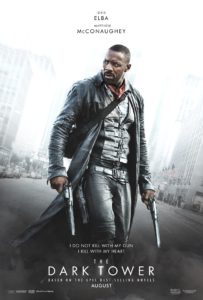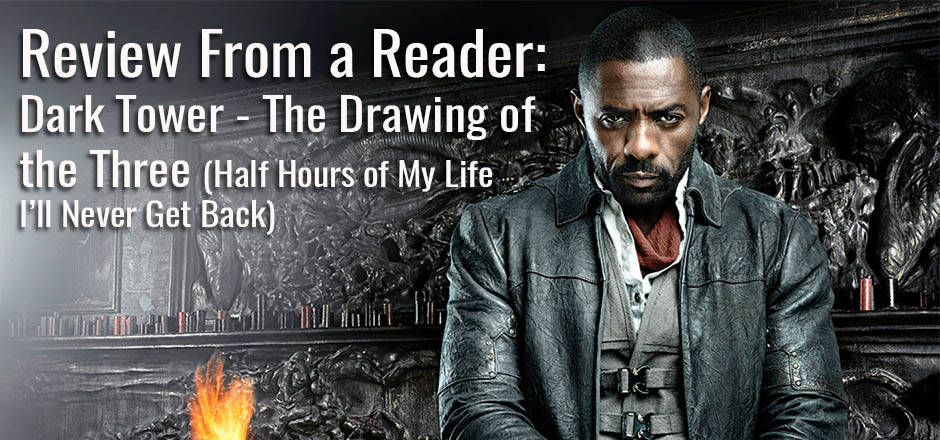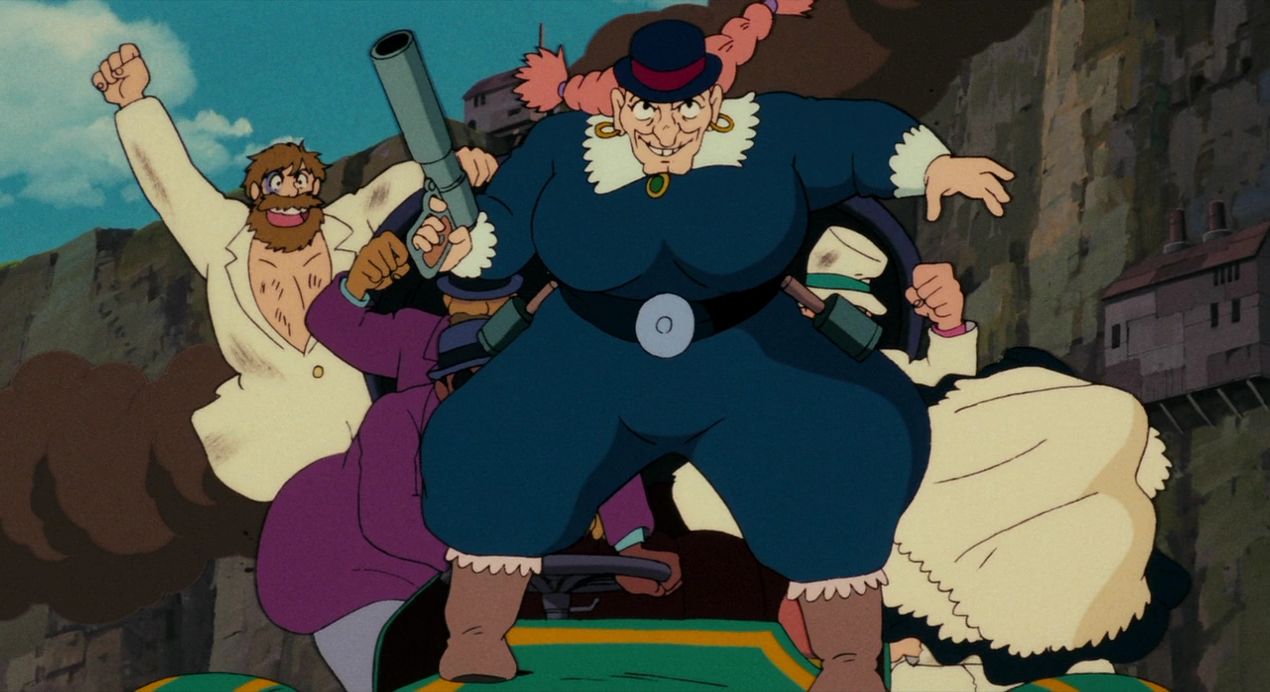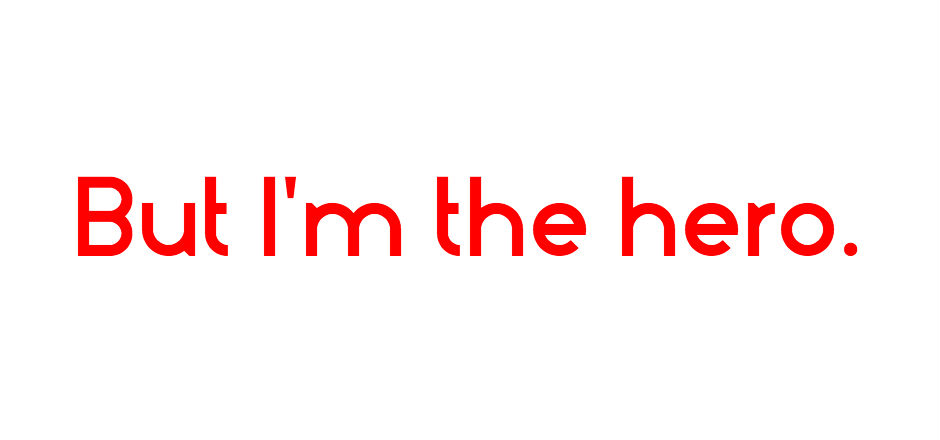Warning! This article contains mild spoilers for the 2017 film The Dark Tower.
Among Stephen King’s inspirations for The Dark Tower, a series of novels he wrote beginning in 1982 and spanning well into the new millennium, was Spaghetti Western classic The Good, the Bad, and the Ugly. It’s appropriate, then, the good, the bad, and the ugly are also the three categories into which you could group popular film adaptations of novels over time. Consider: the good, the bad… And now the ugly. Despite outstanding source material from King’s saga of the same name, Sony Pictures’ adaptation of sci-fi Western The Dark Tower fails both fans of the novel and newcomers alike, due largely to its deviation from the original narrative’s point of view.
The Dark Tower follows Jake Chambers (Tom Taylor), a young boy living with his mother and stepfather in contemporary New York, plagued by dreams of a Man in Black (Matthew McConaughey) bent on destroying the titular Tower, a pillar spread throughout worlds,  protecting them from the darkness on their peripheries. The Man in Black is not alone in Jake’s mind, however: he is accompanied by a foil in Roland Deschain (Idris Elba), a member of a Western knighthood called the Gunslingers, set on defeating the Man in Black. While the adults in Jake’s life are quick to write his dreams off as a means of coping with lingering trauma from the early death of his father, Jake’s visions begin to spill over into reality, forcing him to confront them. Moving between his world and another in his quest to do so, Jake is brought face-to-face with the men of his dreams, and must partner with Roland to defeat the Man in Black, and protect the Tower.
protecting them from the darkness on their peripheries. The Man in Black is not alone in Jake’s mind, however: he is accompanied by a foil in Roland Deschain (Idris Elba), a member of a Western knighthood called the Gunslingers, set on defeating the Man in Black. While the adults in Jake’s life are quick to write his dreams off as a means of coping with lingering trauma from the early death of his father, Jake’s visions begin to spill over into reality, forcing him to confront them. Moving between his world and another in his quest to do so, Jake is brought face-to-face with the men of his dreams, and must partner with Roland to defeat the Man in Black, and protect the Tower.
The Dark Tower is not a direct adaptation of Stephen King’s eponymous, multi-volume series. Rather, it acts as a companion to the series, a narrative that is both a sequel to The Dark Tower and a retelling of The Gunslinger, its first installment. Theoretically, it makes for an adaptation of perfect accessibility: not only will readers of the original novels be able to appreciate it – and find out what comes next for Roland Deschain in a new narrative – but so also will the uninitiated, introduced to characters at the beginning of a new journey.
Theoretically.
Instead, The Dark Tower makes for an hour and a half that is dull at best. This comes from an avid fan of King’s series, who cares for it as neither a sequel nor a parallel Gunslinger, and who actively worries that those new to The Dark Tower are now forever turned off from the books King refers to as his magnum opus.
When I first read The Gunslinger, I was underwhelmed. It struck me as bare, and lacking in emotional depth. It forced the reader to make the entire leap of Roland’s emotional arc herself, rather than King having done the critical, demonstrative work of character development in writing it. And yet, by the time I had finished the novel, I wanted more. I wanted to know what happened to Roland. I wanted to know his journey. I wanted to know more about where he had been and where he would go, and was so driven to devour the rest of the series.
As a film, The Dark Tower starts out similarly, with an exposition that overstays its welcome. Viewers are dragged through the unimaginative, everyday mire of Jake’s life: he awakes each morning from apocalyptic nightmares to a caring mom and brusque, uncaring stepfather. He goes to school, where other students make fun of him. He visits his therapist, where they have a practiced conversation in which Jake shares his dreams as if they are reality, and his therapist presses that they are manifestations of the trauma Jake still experiences from his father’s death. It is in these first 15 minutes of the film – too long for too little to happen when the entirety of a movie fits comfortably into an hour and a half – that The Dark Tower’s most fatal vulnerability is revealed.
The Dark Tower is not a movie about Roland Deschain, the Gunslinger. The Dark Tower is, instead, a movie about a misunderstood boy in desperate need of a father figure, deemed a freak by everyone else in spite of an urgency only he knows to be true and only he is able to stop. In short: The Dark Tower is a movie about one of the oldest, most tired tropes out there. This misframing of its source material is not only gross in its unoriginality, but also creates three much larger problems for the film.
In shifting its focus to Jake, The Dark Tower makes quick work of Roland, forcing him into a role as Jake’s accessory, rather than as its rightful protagonist. We are introduced to the story when we are introduced to Jake, and we are introduced to its many players through Jake, via either his dreams or his stumblings through different worlds. Roland exists only to guide Jake along his path to save the Tower, serve as his muscle along the way, protecting him from various midrange budget special effects, and come to fill the father-shaped hole in Jake’s heart. It not unreasonable that such a father-son relationship would be at the core of The Dark Tower; in fact, it’s an expectation, given the central theme of fatherhood in the books. It is the film’s treatment of fatherhood, however, and Roland’s relegation to serve as a sharp-shooting placeholder in Jake’s conveniently emptied life that makes it so.
Forcing Taylor’s Jake into the limelight seemingly reserved for Elba’s Roland further undoes any accessibility gained by establishing The Dark Tower as a companion, rather than as an explicit sequel or adaptation. Jake, a glorified stock character, is so derivative he sparks active disinterest, and actively pushed me away from The Dark Tower’s mythos, one so beautifully constructed by King in his novels. As a film, The Dark Tower is not one that depicts a universe into which viewers are interested in entering.
Most of all, however, the centering of The Dark Tower on Jake rather than on Roland is an actively dangerous choice. No media exists in a vacuum, and the critical contexts into which a film is released matter just as much whether they’re directly represented in the film or not. Elba’s casting as the seeming lead in a major studio adaptation, met with contention by some, was a huge step forward in an industry where only 12% of Academy Award-eligible films from 2011-2015 had a black leading actor. (It was also The Dark Tower’s saving grace, with Elba’s scenes acting as the closest thing the film has to a saving grace.)
The sidelining of Elba’s Roland, however, has a much more chilling effect on the story, and severely delimits any potential good to be earned from The Dark Tower’s surface representation. Lending Elba’s Roland to Taylor’s Jake, a white boy, creates a dynamic in which a black man is using his own exceptional ability to the benefit of a white person, a trope identified in 2001 by Spike Lee. (It’s worth noting that King is notorious for his use of this trope, though not at fault in the case of the film, as Roland is the series’ protagonist.)
Does Roland’s race matter? Of course not. Roland can absolutely — and should — be played by Elba, a black man. Is Roland entirely at the service of Jake? No, he also has his own agenda as well. Given The Dark Tower’s paramount theme of fatherhood, is Roland’s service to Jake simply paternal, as Ripley’s saving of Newt in Aliens is a maternal one? Certainly.
All of this is true, but The Dark Tower, like all media, does not exist in a vacuum. Instead, it exists in the United States, in the year 2017. Regardless of The Dark Tower’s quality as a film, Idris Elba as the lead in a blockbuster adaptation of a widely popular sci-fi Western series, should have been something to celebrate. Instead, choosing to feature him as a companion to Jake, a distinctly unremarkable protagonist, is offensive at best and dangerous at worst.
As a viewer, I sat down to watch The Dark Tower with high hopes: that it would be a successful companion piece to a book series I love, that it would make a 4,000+ page story more accessible to a wider audience, that it would be a herald for representation and inclusion in Hollywood. Instead, led astray by unimaginative writing and a disastrous adaptive choice, it collapsed.
The Dark Tower is directed by Nikolaj Arcel and has a 95 minute runtime. It stars Idris Elba, Matthew McConaughey, and introduces Tom Taylor. It was released August 4th, 2017, but even if you can still find it playing in a theater, stay home and read the books instead. Picture Idris Elba as Roland. You’ll be glad you did.
[coffee]






